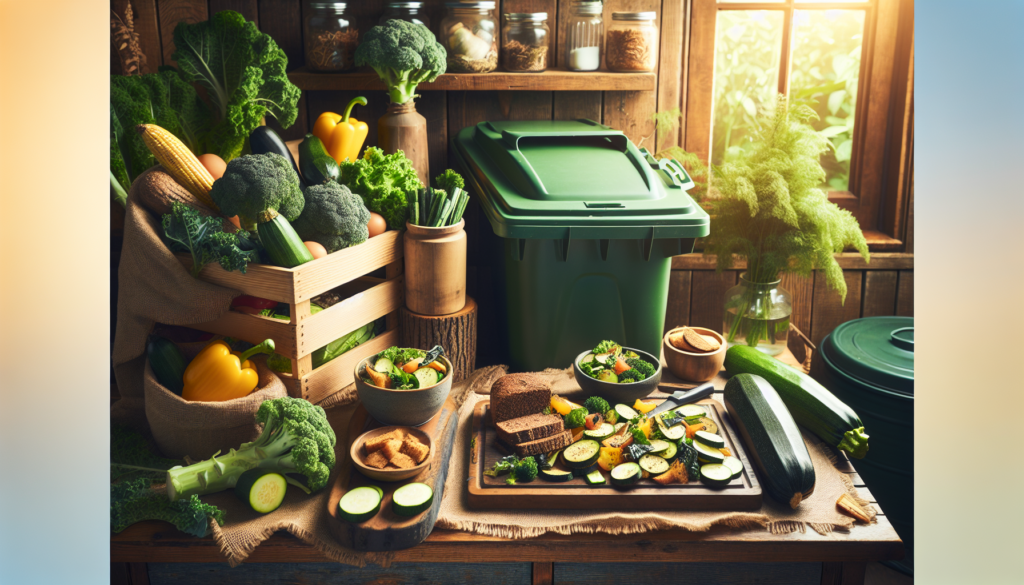If you’re on the keto diet and also care about the planet, we’ve got exciting news for you. In this article, we’ll show you how to combine the principles of a ketogenic lifestyle with eco-friendly eating habits. Discover how you can enjoy delicious, low-carb meals while reducing your impact on the environment. From sourcing sustainable ingredients to minimizing food waste, we’ve got you covered. Get ready to embark on a sustainable keto journey that’s good for both your health and the planet!

Understanding Sustainable Keto
What is the keto diet?
The keto diet, short for ketogenic diet, is a low-carb, high-fat eating plan that aims to shift your body into a metabolic state called ketosis. In this state, your body burns fat for fuel instead of carbohydrates. By strictly limiting the intake of carbohydrates and increasing the consumption of healthy fats, the keto diet can help in weight loss, improve mental focus, and manage certain medical conditions like epilepsy.
What is sustainable eating?
Sustainable eating refers to making food choices that are not only good for your health but also consider the environmental impact of those choices. It involves selecting foods that are ethically sourced, minimally processed, and have a low environmental footprint. Sustainable eating aims to reduce resource consumption, support local economies, and promote the well-being of both the planet and its inhabitants.
Why combine keto and sustainability?
Combining the principles of the keto diet with sustainable eating practices can help you achieve both your health and environmental goals. By focusing on whole, minimally processed foods, the keto diet already aligns with sustainable eating principles to some extent. However, there are additional steps you can take to make your keto diet even more environmentally friendly. These include choosing organic and locally sourced foods, reducing food waste, and cutting down on single-use plastics. By incorporating sustainability into your keto lifestyle, you can make a positive impact on your health and the planet.
Sustainability in Keto Food Choices
Choosing organic and locally sourced foods
Opting for organic and locally sourced foods can have a significant environmental impact. Organic farming practices eliminate the use of synthetic pesticides and fertilizers, reducing soil and water pollution. Additionally, supporting local farmers reduces the carbon footprint associated with transporting food long distances. Look for organic labels and visit farmers’ markets to find fresh, locally produced ingredients for your keto meals.
Opting for sustainable protein sources
Protein is an essential component of the keto diet, but not all sources of protein are created equal in terms of sustainability. Instead of relying solely on animal-based proteins, consider incorporating plant-based protein options such as legumes, tofu, tempeh, and seitan. These alternatives have a lower environmental impact and can provide the necessary protein for your keto diet. Sustainable seafood choices and ethically sourced poultry and eggs are also good options to include.
Reducing food waste
Food waste is a significant issue contributing to environmental degradation. To reduce waste, plan your meals in advance and only buy what you need. Properly store perishable items and make use of leftovers creatively. Additionally, consider composting food scraps instead of sending them to landfill, as this reduces methane emissions. By minimizing food waste, you can save money, conserve resources, and contribute to a more sustainable keto lifestyle.
Cutting down on single-use plastics
Single-use plastics, such as plastic bags, straws, and food containers, have a detrimental impact on the environment. To reduce your reliance on these plastics, opt for eco-friendly alternatives. Carry a reusable water bottle, use glass or stainless steel containers for food storage, and bring your own cloth bags for grocery shopping. These small changes can have a big impact on reducing plastic pollution and promoting a sustainable keto lifestyle.
Using eco-friendly cooking methods
In addition to choosing sustainable ingredients, the way you cook your meals can also have an environmental impact. Use energy-efficient appliances, such as induction cooktops and convection ovens, that reduce energy consumption. Cooking in bulk can also save energy and reduce the need for multiple cooking sessions. Opt for sustainable cooking oils like olive oil or coconut oil that are produced in an environmentally conscious manner. By adopting eco-friendly cooking methods, you can further enhance the sustainability of your keto meals.
The Environmental Impact of Keto
Water consumption
While the keto diet itself does not have a direct impact on water consumption, certain food choices made on the diet can indirectly affect water usage. Animal agriculture, which is a common source of protein on the keto diet, requires significant amounts of water for feed production and livestock maintenance. By choosing plant-based protein options or selecting more sustainable animal protein sources, you can help reduce the water footprint associated with your keto diet.
Carbon footprint
The carbon footprint of the keto diet can vary depending on food choices and preparation methods. Animal-based products, including meat and dairy, tend to have a higher carbon footprint due to the emissions associated with livestock farming. However, by opting for sustainably sourced animal products and incorporating plant-based protein sources into your keto meals, you can reduce your carbon footprint significantly. Additionally, choosing cooking oils with a lower carbon footprint, such as those derived from sustainable sources, can further contribute to a more environmentally friendly keto lifestyle.
Land use
The keto diet’s impact on land use is primarily influenced by the consumption of animal-based products. Livestock farming requires vast amounts of land for grazing or growing feed crops, contributing to deforestation and habitat destruction. To minimize the land use associated with your keto diet, consider reducing your reliance on animal products and incorporating plant-based protein sources into your meals. By doing so, you can help protect natural habitats and preserve biodiversity.
Balancing Macros and Sustainability
Optimizing fat intake
The keto diet emphasizes consuming high levels of healthy fats to promote ketosis. When selecting fats, opt for those that are sustainably sourced and produced. Look for oils that are certified organic, responsibly harvested, and have a low environmental impact. Coconut oil, avocado oil, and extra virgin olive oil are good choices. By prioritizing sustainable fat sources, you can maintain the health benefits of the keto diet while minimizing your impact on the environment.
Reducing reliance on animal products
While animal-based products are commonly consumed on the keto diet, it is possible to reduce your reliance on them. By including more plant-based protein options, such as legumes, nuts, and seeds, you can decrease the environmental impact associated with animal agriculture. Experiment with vegetarian or vegan keto meals to explore alternative protein sources.
Including plant-based proteins and fats
Incorporating plant-based proteins and fats into your keto diet not only helps reduce the environmental footprint but also provides additional health benefits. Legumes, tofu, tempeh, and seitan are excellent sources of plant-based protein, while avocados, olives, and nuts are great sources of plant-based fats. These foods are rich in nutrients, fiber, and antioxidants, making them valuable additions to your sustainable keto meals.
Choosing sustainable carbohydrates
While the keto diet restricts carbohydrate consumption, there are still sustainable carbohydrate options you can include. Opt for whole grains like quinoa, brown rice, and oats, which have a lower environmental impact compared to highly processed grains. Additionally, choose locally sourced and organic fruits and vegetables that are in season to minimize carbon emissions associated with long-distance transportation.

Seasonality and Locally Sourced Produce
Benefits of eating seasonally
Eating seasonally has several advantages for both your health and the environment. Seasonal produce is more likely to be fresher, more flavorful, and more nutrient-dense. It often requires fewer synthetic pesticides and preservatives for transport and storage. By supporting seasonal agriculture, you also contribute to local economies and reduce the energy required to transport out-of-season produce. Embrace the abundance of each season and enjoy the diverse flavors and nutritional benefits it provides.
Finding local farmers’ markets
One of the best ways to access seasonal and locally sourced produce is by visiting farmers’ markets. These markets offer a wide variety of fresh fruits, vegetables, and other sustainable food products directly from local growers. By shopping at farmers’ markets, you can support small-scale farmers, reduce food miles, and foster a sense of community. Connect with local farmers, ask about their growing practices, and discover new keto-friendly ingredients to incorporate into your sustainable eating plan.
Growing your own produce
For the ultimate in sustainability and freshness, consider growing your own produce. Even if you have limited space, you can still cultivate herbs, lettuces, or cherry tomatoes in pots or small gardens. Home gardening allows you to control the use of pesticides and fertilizers, reduce packaging waste, and have a more direct connection to your food. Not only will you enjoy the experience of growing your own keto-friendly foods, but you will also contribute to a more sustainable and environmentally friendly lifestyle.
Meal Planning and Batch Cooking
Reducing food waste through meal planning
One of the easiest ways to reduce food waste is through meal planning. Before heading to the grocery store, plan your meals for the week, taking stock of what ingredients you already have and what needs to be used up. By only purchasing what you need and knowing exactly what meals you will prepare, you can avoid overbuying and wasting food. Organize your shopping list according to the ingredients needed for your planned meals, and stick to it to minimize impulse purchases.
Preparing meals in advance
Batch cooking is a time-saving technique that involves preparing larger quantities of food and storing them for future meals. By dedicating a few hours each week to cook in bulk, you can have ready-made keto meals whenever you need them, reducing the temptation to order takeout or resort to processed convenience foods. Invest in airtight, reusable containers to store your batch-cooked meals, further reducing waste from single-use packaging.
Investing in reusable storage containers
To ensure your meal planning and batch cooking efforts remain sustainable, invest in reusable storage containers. Opt for glass, stainless steel, or BPA-free plastic containers that are durable and can be reused multiple times. Not only do these containers help reduce waste from disposable food packaging, but they also keep your meals fresh, maintain flavors, and prevent cross-contamination.
Making use of leftovers
Leftovers often get overlooked and end up being thrown away, contributing to food waste. Instead of letting them go to waste, get creative and repurpose them into new meals. For example, leftover roasted chicken can be shredded and used in a keto-friendly salad or turned into a delicious broth. Vegetables can be incorporated into omelets or frittatas. By making use of leftovers, you minimize waste and maximize the sustainability of your keto meals.

Reducing Single-Use Plastics
Using reusable water bottles
Single-use plastic water bottles are incredibly wasteful and contribute to the growing global plastic pollution problem. Invest in a reusable water bottle made of stainless steel, glass, or BPA-free plastic and carry it with you wherever you go. By refilling your bottle with tap water or filtered water, you can eliminate the need for single-use plastic bottles and help protect the environment.
Avoiding disposable cutlery and plates
When dining out or eating takeout meals, disposable cutlery and plates are often provided, leading to unnecessary waste. To reduce your reliance on single-use items, bring your own reusable cutlery set and a lightweight, collapsible container for takeout food. These small steps can have a significant impact on reducing plastic waste and promoting a sustainable keto lifestyle.
Choosing sustainable food storage options
Single-use plastic bags and cling wrap are commonly used for food storage but contribute to plastic pollution. Instead, opt for sustainable food storage options such as beeswax wraps, silicone food bags, or glass containers with airtight lids. These alternatives are durable, reusable, and can help keep your keto meals fresh while reducing your environmental footprint.
Eco-Friendly Cooking Methods
Using energy-efficient appliances
When cooking your keto meals, using energy-efficient appliances can make a big difference in reducing your environmental impact. Look for appliances with energy-saving features such as induction cooktops, convection ovens, and slow cookers. These appliances minimize energy waste and can help you save on electricity bills.
Cooking in bulk
Cooking in bulk not only saves time but also reduces energy consumption. By preparing larger portions of your favorite keto meals, you can minimize the need for multiple cooking sessions throughout the week. This approach not only reduces energy usage but also encourages you to make mindful food choices and maintain a sustainable keto lifestyle.
Choosing sustainable cooking oils
Cooking oils play a crucial role in your keto meals, both in terms of taste and health benefits. Opt for sustainable cooking oils that are produced in an environmentally conscious manner. Coconut oil, avocado oil, and extra virgin olive oil are excellent options that are not only beneficial to your health but also have a lower environmental impact compared to some other oils. Choose oils that are certified organic and sustainably sourced whenever possible.

Incorporating Sustainable Protein Sources
Plant-based protein options
To reduce your environmental impact while staying in ketosis, consider incorporating more plant-based protein options into your diet. Legumes, tofu, tempeh, seitan, and plant-based protein powders are excellent choices for keto-friendly meals. Plant-based proteins have a lower carbon footprint and require fewer resources compared to animal-based proteins, making them a more sustainable choice.
Sustainable seafood choices
If you choose to include seafood in your keto diet, opt for sustainably sourced options. Look for seafood certified by organizations such as the Marine Stewardship Council (MSC) or the Aquaculture Stewardship Council (ASC). These certifications ensure that the seafood has been responsibly harvested and does not contribute to overfishing, habitat destruction, or pollution.
Selecting ethically sourced poultry and eggs
When consuming poultry and eggs on the keto diet, it is important to choose ethically sourced options. Look for products labeled as organic, free-range, or pasture-raised, as these indicate that the animals were raised in better conditions and had access to natural environments. Supporting ethical farming practices promotes animal welfare and reduces the environmental impact associated with intensive animal agriculture.
Dining Out and Traveling Sustainably
Researching sustainable restaurants
When dining out, research and choose restaurants that prioritize sustainability. Look for establishments that source their ingredients locally, use organic or sustainably grown produce, and minimize food waste. Ethical restaurants often highlight their sustainability practices on their websites or menus. By supporting these establishments, you are not only enjoying a keto-friendly meal but also promoting sustainable practices within the food industry.
Making eco-friendly choices when traveling
When traveling, it can be challenging to maintain a sustainable keto lifestyle. However, there are still steps you can take to minimize your environmental impact. Choose eco-friendly transportation methods whenever possible, such as public transit or biking. Avoid single-use plastics by carrying a reusable water bottle, cutlery set, and food containers. Seek out local markets or grocery stores to purchase sustainable and keto-friendly ingredients for meals on the go.
Finding keto-friendly options on the go
Finding keto-friendly options when dining out or traveling can be challenging, especially if you have specific dietary restrictions. However, with some research and planning, it is possible to find suitable choices. Look for restaurants that offer customizable options, such as salads or protein bowls, so you can tailor your meal to fit your keto needs. Many establishments are also accommodating to dietary requests, so don’t hesitate to ask for substitutions or modifications that align with your sustainable keto lifestyle.
By embracing sustainable keto practices, you can combine the health benefits of the keto diet with environmentally conscious choices. From selecting organic and locally sourced foods to reducing food waste and single-use plastics, every step you take towards sustainability contributes to a healthier planet. With mindful meal planning, eco-friendly cooking methods, and a focus on sustainable protein sources, you can enjoy a keto lifestyle that supports both your health and the environment. So, take charge and begin your journey towards sustainable keto eating today!


